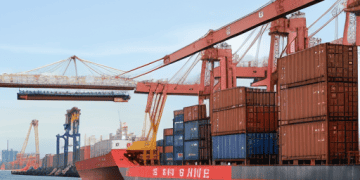The International Longshoremen’s Association (ILA), which represents 47,000 dockworkers across major Eastern US and Gulf Coast ports, has issued a warning of a potential strike scheduled for January 15. The union’s leadership is seeking stronger protections against automation technologies that could replace human labor in port operations.
The ongoing dispute with the United States Maritime Alliance (USMX), which represents shipping lines and terminal operators, centers on concerns over automation in port activities. USMX had proposed maintaining the existing automation clauses from the expired contract, but the ILA is demanding stronger protections to prevent semi-autonomous equipment from performing certain tasks typically handled by workers.
Automation has increasingly threatened the role of skilled labor in global shipping, a trend that has gained momentum in US ports. If the strike proceeds, it could result in disruptions to the flow of cargo and higher freight rates, which may be passed on to consumers in the form of increased prices. In preparation for the possibility of a strike, shipping companies such as Hapag-Lloyd have informed customers that surcharges will apply to containers affected by the walkout.
The strike would also place strain on container shipping schedules. Delays could lead to the cancellation of voyages, as ships are forced to wait outside ports until they can dock. The current situation of limited shipping capacity, exacerbated by geopolitical issues such as Houthi attacks in the Red Sea, would further compound the impact.
Economists generally predict that if the strike lasts less than a week or two, its economic impact on the US economy, estimated at between US$1 billion to US$5 billion per day, would be manageable. However, if the strike extends for weeks, supply chain disruptions could affect industrial production and consumer sentiment, particularly in sectors like automotive manufacturing, which are better prepared with contingency plans and inventory.
In response to these concerns, the Port of Los Angeles has seen an increase in activity in anticipation of possible disruptions, with import orders front-loaded to minimize delays.
Politically, the strike puts pressure on President-elect Donald Trump, who faces a delicate decision. Under the Taft-Hartley Act, the US president has the authority to intervene and end a strike. While Trump has previously voiced support for the ILA’s stance on automation, the long-term competitiveness of US ports could be compromised if automation advancements are halted in future contracts.
The situation remains fluid as the two parties continue negotiations, with a resolution needed before the planned strike date.
Get the newest supply chain report news updates at The Supply Chain Report. Interested in international trade? Check out ADAMftd.com for free tools.
#USPortStrike #AutomationDebate #LaborRights #PortWorkersUnite #SupplyChainDisruption #AutomationVsJobs #GlobalTradeImpacts















